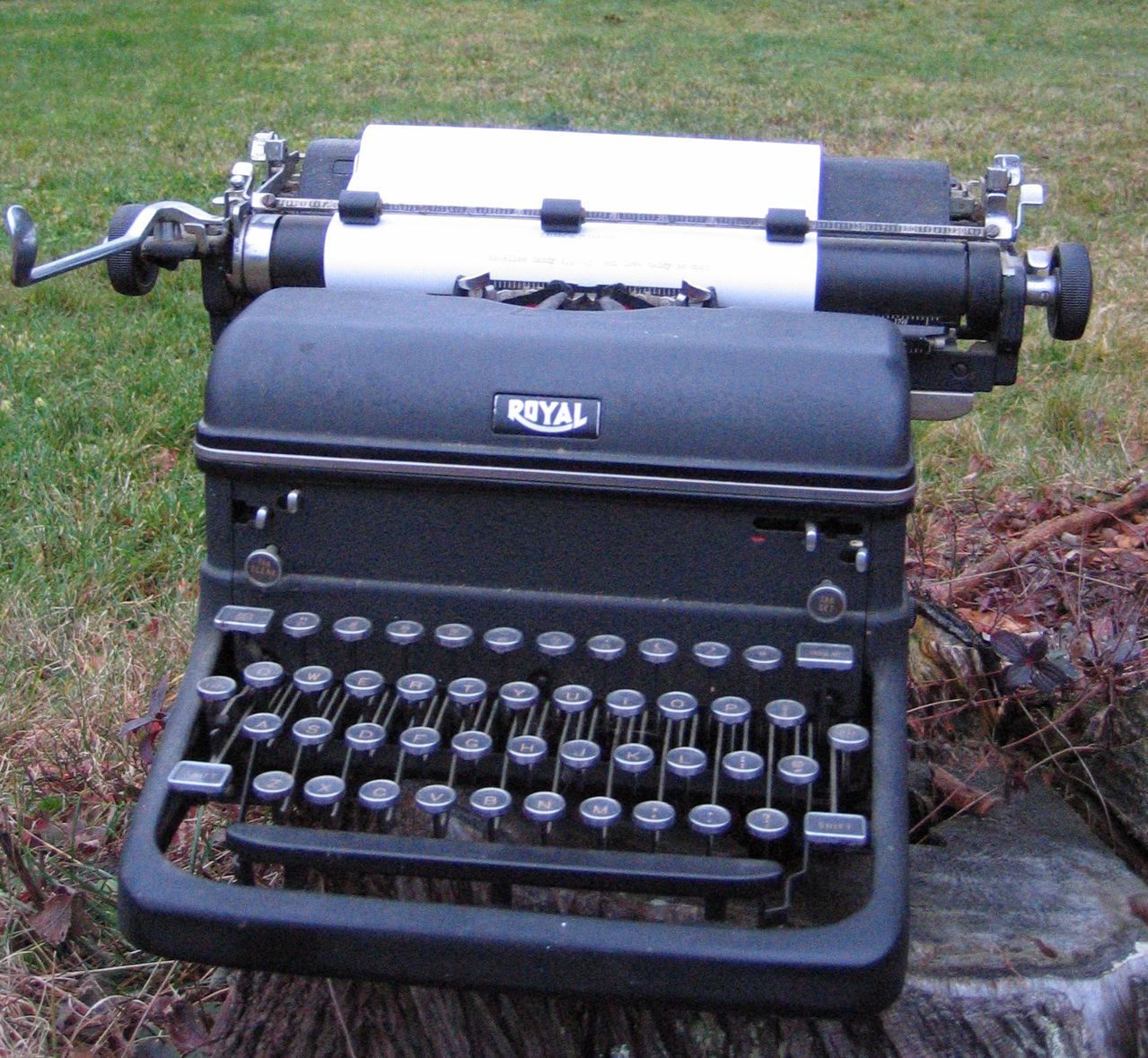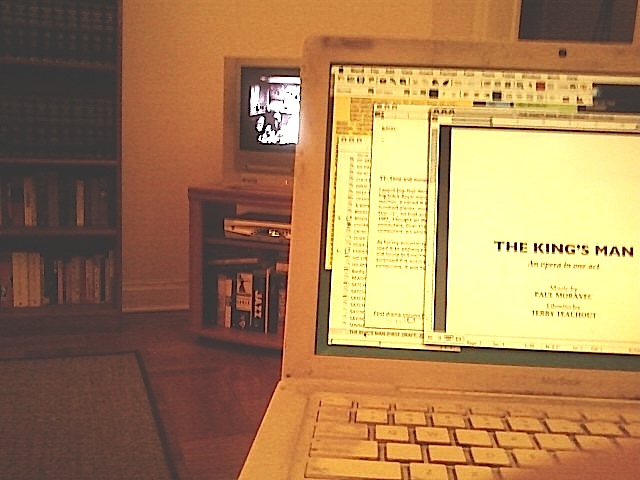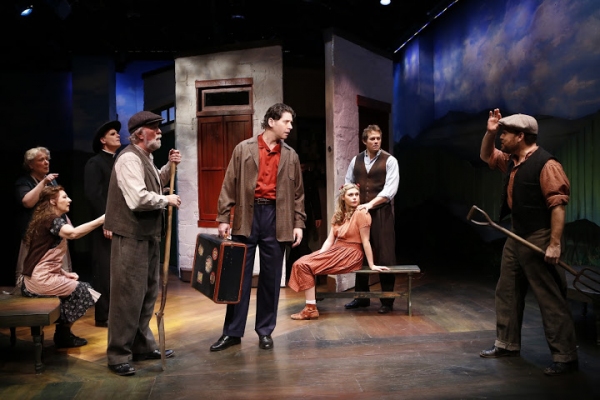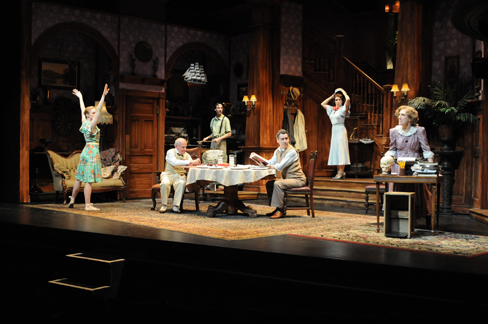All in the Timing (Primary Stages, 59E59 Theatres, 59 E. 59, newly extended through Apr. 28). A twentieth-anniversary off-Broadway revival of the program of six one-act comedies, by turns surreal and poignant, that first put David Ives on the map of American theater. I didn’t see the 1993 production, but I can’t imagine how it could have been better than this glittering version, perfectly staged by John Rando, Ives’ frequent collaborator, and acted with colossal éclat by five young actors who fit together like the pieces of a platinum-plated jigsaw puzzle (TT).
Archives for February 2013
TT: Yours in haste
 I spent the first decade of my life as a professional writer using a big black Royal manual typewriter that had once belonged to my mother. (I called it my “acoustic typewriter.”) I wrote several hundred pieces, most of them concert reviews and record columns for the Kansas City Star, on that ancient but impeccably reliable machine. Then, in 1987, I bought an IBM PC, and since then I’ve written exclusively on computers. By now I’ve owned a half-dozen personal computers, on which I’ve written six books and edited three essay collections.
I spent the first decade of my life as a professional writer using a big black Royal manual typewriter that had once belonged to my mother. (I called it my “acoustic typewriter.”) I wrote several hundred pieces, most of them concert reviews and record columns for the Kansas City Star, on that ancient but impeccably reliable machine. Then, in 1987, I bought an IBM PC, and since then I’ve written exclusively on computers. By now I’ve owned a half-dozen personal computers, on which I’ve written six books and edited three essay collections.
Of late I’ve been wondering exactly what effect the coming of the computer has had on my writing life. Is it easier now, or harder?
I realized soon after I bought my first computer that it cut much of the waste motion out of the process of writing. I’d say that I write twice as fast on computers as I did on my old typewriter–but instead of using the time that I save for purposes of leisure, I write roughly twice as much as I did before 1987. To be specific, I write a hundred thousand words a year for The Wall Street Journal and Commentary, an amount roughly equal to a medium-sized book. My blog entries probably come to another fifty thousand words, more or less. I publish a book every two or three years, and since 2009 I’ve also written three plays and three opera libretti. That’s a lot of words, and I know that I couldn’t churn out nearly as many on a typewriter, manual or otherwise.
In addition, computers make it possible for me to do serious research at my desk without having to go to libraries. It took me just three years to write Duke: A Life of Duke Ellington, as opposed to the decade that went into The Skeptic: A Life of H.L. Mencken, virtually all of which was written before Google came along. It takes me three hours to write a Wall Street Journal drama column, and my guess is that without Google, I’d have to spend another hour or so sifting through my home library in search of relevant information.
All of which suggests that the easier-harder dichotomy is a false one. Computers make it vastly easier for me to write, but they also facilitate greater productivity, which in turn makes my life harder. And that leads me to ask: ought I to be writing as much as I do? Might I write better if I wrote less?
For the most part, we write as we must, not as we will. I’ve always been a fast writer, just as I’m a fast reader, and I take it for granted that this facility is at best a mixed blessing. It is, however, part of my impatient nature, and I accept it as such. I rarely slave over my Wall Street Journal drama columns: they just come out. Nor do I write them for the ages. They’re journalism, about which H.L. Mencken said the last word in the preface to A Mencken Chrestomathy:
What the total of my published writings comes to I don’t know precisely, but certainly it must run well beyond 5,000,000 words. A good deal of it, of course, was journalism pure and simple–dead almost before the ink which printed it was dry.
I’m not saying that I don’t take my drama columns seriously. I do–very much so–and I think it shows. But I also accept the inescapable limitations of the medium in which I work. I doubt that I’ll ever collect my Wall Street Journal reviews, any more than I’d publish a volume of my blog posts. I prefer to transform the very best of them into longer, more considered essays, just as Mencken used his newspaper journalism as not-quite-raw material for his magazine articles and books.
 I am, however, dodging the issue. Could I be a better writer if I wrote less and thought more? Does my computer-driven life include enough room for contemplation?
I am, however, dodging the issue. Could I be a better writer if I wrote less and thought more? Does my computer-driven life include enough room for contemplation?
The theologian Josef Pieper spoke to this very point in a beautiful little book called, appropriately enough, Leisure, the Basis of Culture:
Leisure is a form of silence, of that silence which is the prerequisite of the apprehension of reality: only the silent hear and those who do not remain silent do not hear. Silence, as it is used in this context, does not mean “dumbness” or “noiselessness”; it means more nearly that the soul’s power to “answer” to the reality of the world is left undisturbed. For leisure is a receptive attitude of mind, a contemplative attitude, and it is not only the occasion but also the capacity for steeping oneself in the whole of creation.
This isn’t the first time that I’ve worried about such matters. I blogged about them three years ago, at which time I asked myself (and you) the following question: “What has vanished along the way, at least for the moment, is the wasted time that is never wasted, the fallow idleness that eventually bears unforeseen fruit. Will my imagination dry up a year from now because I was too busy to daydream today?”
That’s still a good question. On the other hand, it’s also true that since I wrote those words, I’ve become a part-time playwright, a development that I never envisioned in 2010. In fact, I wrote those words just before I started writing the first draft of Satchmo at the Waldorf. So I must be doing something right–but is it right enough?
 I took what I believe to be a step in a more fruitful direction by going to the MacDowell Colony last summer and spending five weeks in semi-seclusion, working on Duke and Satchmo at the Waldorf. It was the most productive period of my life. Was it a contemplative period? Yes and no. I worked like a demon, but I did it in a peaceful rural setting, completely divorced from my hectic urban routine, and I spent a fair amount of my time there walking, thinking, and talking to other artists, two of whom became close and valued friends.
I took what I believe to be a step in a more fruitful direction by going to the MacDowell Colony last summer and spending five weeks in semi-seclusion, working on Duke and Satchmo at the Waldorf. It was the most productive period of my life. Was it a contemplative period? Yes and no. I worked like a demon, but I did it in a peaceful rural setting, completely divorced from my hectic urban routine, and I spent a fair amount of my time there walking, thinking, and talking to other artists, two of whom became close and valued friends.
Should I be doing more of that? Undoubtedly, though I don’t know how to work it yet. What I do know is that I want to write more plays, and what I fear is that I’ll find that increasingly difficult to do unless I find a different way to lead my life. But I may be wrong. I may be, like Duke Ellington, a person whose nature demands that he be constantly active. As I wrote in Duke:
Ellington composed as he lived, on the road and on the fly. He wrote his pieces in hotel rooms, Pullman cars, and chartered buses, then rehearsed them in the recording studio the next afternoon or on the bandstand the same night. He had little choice but to do so, for he was a professional wanderer who traveled directly from gig to gig, returning to his New York apartment, he said, only to pick up his mail. It would no more have occurred to him to take time off to polish a composition than to go on a month-long vacation.
I don’t know that I like the sound of that kind of life. It is, however, the life that I currently lead, for better and worse.
As for my acoustic typewriter, I gave it back to my mother, who used it to address envelopes. So far as I know, it still resides at her old house in Smalltown, U.S.A. It outlived her, and I wouldn’t be surprised if it outlives me. Unlike human beings, or personal computers, it was built to last.
TT: Just because
Chet Atkins plays “Vilja” and “Say Si Si” on Ozark Jubilee in 1958:
(This is the latest in a series of arts-related videos that appear in this space each Monday and Wednesday.)
TT: Almanac
“If it’s a musical, and it’s not about love, I don’t see the point.”
David Ives (quoted in Pia Catton, “Parsing a Playwright’s Universal Language,” The Wall Street Journal, Feb. 3, 2013)
TT: Arise and go to Innisfree
In today’s Wall Street Journal drama column I have good things to say about an off-Broadway show, the Irish Rep revival of Donnybrook!, and an out-of-town show, the Asolo Rep revival of You Can’t Take It With You in Sarasota. Here’s an excerpt.
* * *
 Turning a classic movie into a stage musical is a risky proposition that usually pays off in grief. When the source material is ultra-familiar and the original film full of top-tier stars, it’s all but impossible to survive the comparison game. Johnny Burke, one of the greatest lyricists of the golden age of Hollywood musicals, tried to bring John Ford’s “The Quiet Man” to Broadway in 1961 and failed dismally. “Donnybrook!” closed after 68 performances and was never seen again–until now. It makes sense that the Irish Repertory Theatre should have taken an interest in a musical set in Innisfree, and Charlotte Moore, the company’s artistic director, has contrived with her usual deftness to paper over the show’s flaws and bring its considerable charms to the fore.
Turning a classic movie into a stage musical is a risky proposition that usually pays off in grief. When the source material is ultra-familiar and the original film full of top-tier stars, it’s all but impossible to survive the comparison game. Johnny Burke, one of the greatest lyricists of the golden age of Hollywood musicals, tried to bring John Ford’s “The Quiet Man” to Broadway in 1961 and failed dismally. “Donnybrook!” closed after 68 performances and was never seen again–until now. It makes sense that the Irish Repertory Theatre should have taken an interest in a musical set in Innisfree, and Charlotte Moore, the company’s artistic director, has contrived with her usual deftness to paper over the show’s flaws and bring its considerable charms to the fore.
The comparison game always starts with casting. Whom do you put in a musical whose original film version starred John Wayne, Maureen O’Hara and a gaggle of scene-stealing character actors? In Wayne’s case, Ms. Moore has opted for a tall, bluff fellow with a magnificent singing voice. James Barbour, who was last seen on Broadway in “A Tale of Two Cities,” is a sterling-silver musical-comedy baritone, and “Donnybrook!” takes wing whenever he opens his mouth. No, he doesn’t have Wayne’s redwood-like physical presence, but the Duke, on the other hand, couldn’t carry a tune in a holster, so I’d call it a draw….
The main reason for the initial failure of “Donnybrook!” was Mr. Burke’s good-to-middling score, for which he supplied both words and music. While he was a big-league lyricist, Mr. Burke was strictly an amateur composer–it was his longtime collaboration with Jimmy Van Heusen that put him on the map–and “Donnybrook!” contains only one song, “Sad Was the Day,” that is comparable in quality to the songs that he wrote with Mr. Van Heusen. (Stephen Sondheim included it in a list of songs he wished he’d written.) To that end, Ms. Moore has done no small amount of smart musical tinkering, dropping some of the weaker songs and interpolating two blue-chip Burke-Van Heusen ballads, “But Beautiful” and “It Could Happen to You,” plus an assortment of authentic Irish tunes…
 Now that regional theaters across the country are feeling the economic bite, they’re increasingly steering clear of large-cast, big-budget plays. Not so Florida’s Asolo Repertory Theatre, which has just revived “You Can’t Take It With You,” the 1936 screwball farce about a loony but lovable Depression-era family that won George S. Kaufman and Moss Hart a Pulitzer Prize and was turned by Frank Capra into an equally popular (if less effective) movie. If you’ve come down with the February blues, this production will return you to the right side of the bed.
Now that regional theaters across the country are feeling the economic bite, they’re increasingly steering clear of large-cast, big-budget plays. Not so Florida’s Asolo Repertory Theatre, which has just revived “You Can’t Take It With You,” the 1936 screwball farce about a loony but lovable Depression-era family that won George S. Kaufman and Moss Hart a Pulitzer Prize and was turned by Frank Capra into an equally popular (if less effective) movie. If you’ve come down with the February blues, this production will return you to the right side of the bed.
“You Can’t Take It With You” calls for a cast of 19, thus putting out of reach of most of today’s professional troupes. Fortunately, Asolo Rep, a regional company that doubles as a drama school, can use student actors to cover smaller roles, as it did last season with “Once in a Lifetime,” the first Kaufman-Hart collaboration, and is doing again now. I know all about lightning not striking twice, but this production, soundly and skillfully directed by Peter Amster, is at least as good as its predecessor….
* * *
Read the whole thing here.
A trailer for Donnybrook!:
TT: Almanac
“All the plays that have ever been written, from ancient Greece to the present day, have never really been anything but thrillers.”
Eugène Ionesco, Victims of Duty
TT: So you want to see a show?
Here’s my list of recommended Broadway, off-Broadway, and out-of-town shows, updated weekly. In all cases, I gave these shows favorable reviews (if sometimes qualifiedly so) in The Wall Street Journal when they opened. For more information, click on the title.
BROADWAY:
• Annie (musical, G, reviewed here)
• Once (musical, G/PG-13, nearly all performances sold out last week, reviewed here)
OFF BROADWAY:
• All in the Timing (comedy, PG-13, extended through Apr. 14, reviewed here)
• Avenue Q (musical, R, adult subject matter and one show-stopping scene of puppet-on-puppet sex, reviewed here)
• The Fantasticks (musical, G, suitable for children capable of enjoying a love story, reviewed here)
IN ORLANDO, FLA.:
• Othello (Shakespeare, PG-13, closes Mar. 16, reviewed here)
CLOSING SOON ON BROADWAY:
• The Mystery of Edwin Drood (musical, PG-13, closes Mar. 10, reviewed here)
CLOSING NEXT WEEK ON BROADWAY:
• The Other Place (drama, PG-13, closes Mar. 3, most performances sold out last week, reviewed here)
• Who’s Afraid of Virginia Woolf? (drama, PG-13/R, closes Mar. 3, reviewed here)
CLOSING NEXT WEEK IN WEST PALM BEACH, FLA.:
• A Raisin in the Sun (drama, PG-13, closes Mar. 3, reviewed here)
CLOSING SUNDAY IN ORLANDO, FLA.:
• Laughter on the 23rd Floor (comedy, PG-13, reviewed here)
CLOSING SUNDAY ON BROADWAY:
• Picnic (drama, PG-13, most performances sold out last week, reviewed here)
TT: Almanac
“Oh words, what crimes are committed in your name!”
Eugène Ionesco, Jacques or the Submission
